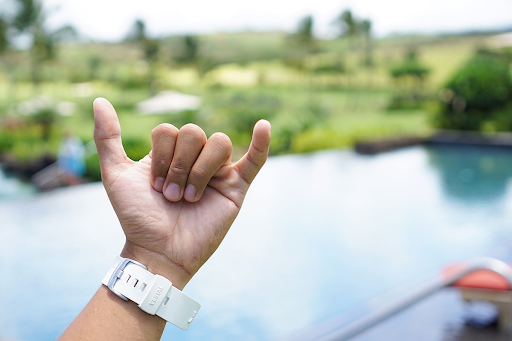Immersing yourself in the local culture of Hawaii can elevate your travel experience, and one of the most rewarding ways to connect with the vibrant spirit of Hawaii is by familiarizing yourself with its unique language.
While English is widely spoken and understood throughout the islands, taking the time to learn some essential Hawaiian greetings and words can open doors to a deeper connection with the people, the land, and the rich cultural heritage that defines this tropical paradise. The effort of learning their language demonstrates respect for the culture and showcases your genuine interest in connecting with the local community. This small gesture will not only be appreciated by the residents but also provide you with a profound sense of belonging and cultural appreciation.
Here are some Hawaiian words, phrases, and greetings that every tourist should know or learn if they’re visiting Hawaii:
Hawaiian Words – Basic Words With A Lot Of Meaning
It’s pretty obvious that learning a new language can be challenging, especially when it comes to sentences and complete fluency. That’s why it’s helpful to begin with the basics and focus on easy words first. If you’re planning a trip to Hawaii, knowing a few essential Hawaiian words is a great way to connect with the local culture. Here are some fundamental words to get you started:
Aloha
Aloha embodies the warm and welcoming spirit of Hawaii. It can mean hello, goodbye, love, affection, and peace. It represents the essence of connecting with others and fostering harmony.
Mahalo
Mahalo is the Hawaiian way to express gratitude and say thank you. It carries a heartfelt appreciation for acts of kindness or assistance received.
E komo mai
The meaning of e komo mai is pretty simple. It’s a Hawaiian phrase used to say “welcome.” It invites others to enter or join in a friendly and inclusive manner.
Ohana
Ohana signifies family, extending beyond blood relations to include close friends and even the community. It emphasizes the value of strong bonds and a sense of unity.
Hana
Hana means work or to do. It highlights the importance of putting effort into tasks or activities and emphasizes productivity and engagement.
Fact: Hana is also a place in Hawaii. Road to Hana is a famous tourist spot in Maui.
Pau hana
Pau hana refers to the end of the workday, after work, or finished work. It signifies the time to relax, unwind, and enjoy leisure activities.
Moana
Moana means ocean or water. It represents the vastness and beauty of the ocean, symbolizing adventure, exploration, and connection to the surrounding islands.
Mauka
Mauka indicates the direction towards the mountains or inland. It is commonly used for giving directions or describing locations in relation to the mountains.
Makai
Makai refers to the direction toward the sea. It helps to describe locations or provide orientation based on the ocean’s proximity.
Mahina
Mahina means moon or moonlight. In Hawaiian culture, the moon holds spiritual and cultural significance, representing the changing cycles of nature.
Must Read : 3 things that thrive at night in Hawaii
Pua
Pua means flower or offspring. This word celebrates the vibrant and delicate blossoms that grace the islands, symbolizing beauty and fragility.
Ono
Ono describes something delicious, pleasable, or tasty. It is a word that’s commonly used to express the enjoyment of delightful food and flavors found in Hawaiian cuisine.
Nalu
Nalu means wave or the surfs in the ocean. With Hawaii’s renowned surf culture and stunning coastal scenery, nalu captures the energy and power of the ocean waves.
Also Read : Staying Near Oahu Culture + Scenery
Keiki
Keiki refers to a child or children and is pronounced as “kay-kee”. It is an endearing term used to describe young ones and represents the future generation.
Hapai
Hapai means pregnant. It acknowledges the special stage of carrying new life and celebrates the beauty of motherhood.
Mau loa
Mau loa translates to forever or eternal. This word signifies the enduring and timeless nature of something, emphasizing its long-lasting quality or significance.
Paniolo
Paniolo is a Spanish word that refers to a cowboy or cowgirl. But in Hawaii, it’s used to call someone who herds cattle. It reflects the influence of the ranching and cowboy culture in Hawaii, particularly on the Big Island.
Pupu
Pupu describes appetizers, finger food, or snacks. This word is used for the delectable small bites enjoyed during social gatherings or pau hana.
Wai
Wai is the Hawaiian word for freshwater or just water. Water holds deep respect in Hawaiian culture as a life-giving force, essential for sustenance, cleansing, and spiritual rituals.
Aina
Aina translates to land or earth. It symbolizes the connection between the Hawaiian people and their ancestral lands, representing a deep respect and stewardship for the environment.
By familiarizing yourself with these essential words, your communication skills will automatically become smoother, and you’ll have an even greater time immersing yourself in the vibrant culture of the islands!
Hawaiian Words for Men and Women
The Hawaiian word for man is “kāne” and for a woman, it is “wahine.”
Hawaiian Greetings
Now that you have learned the essential Hawaiian words, it’s time to delve into Hawaiian greetings. Greetings hold the key to connecting with others and immersing yourself in the spirit of Hawaii. Once you familiarize yourself with these Hawaiian greetings, you get to enhance your ability to connect with the locals and fully experience the culture of the islands. Let’s explore some of the common Hawaiian greetings that will enrich your time in Hawaii:
E komo mai i ka hale
Experience the true spirit of Hawaiian hospitality with the heartfelt phrase “E komo mai i ka hale,” which means “Enter the house” or “Come into the house”. This warm and inviting greeting extends beyond a simple welcome, embracing others with open arms and creating a sense of belonging and comfort in the shared space.
Also Read: Where To Stay In Hawaii For The First Time: A Guide To Finding The Best Accommodation
Pehea kāu nā’au
Dive deeper into meaningful connections by asking “Pehea kāu nā’au,” which translates to “How are you” or “How is your heart/mind?” This genuine question is a meaningful way to go beyond surface-level conversations, showing sincere interest in someone’s emotional well-being and providing a safe space for open and authentic dialogue.
Hau’oli lā hānau
Looking to spread joy and celebrate someone’s birthday? Try the phrase “Hau’oli lā hānau” which means “Happy birthday.” This cheerful expression conveys your heartfelt wishes for a joyous and memorable celebration, as you join in commemorating their special day and making them feel truly appreciated.
Also Read : Top Seven Upcoming Festivals and Celebrations in the Islands
A hui hou kākou
Bid farewell with the heartfelt phrase “A hui hou kākou,” which means “Until we meet again.” This parting phrase carries a sense of fondness and hopeful anticipation of future reunions, leaving a lasting impression of connection and the sincere desire to cross paths once more.
Aloha ‘oe
Get the opportunity to express your affectionate farewell with “Aloha ‘oe,” which translates to “Farewell to you”. This timeless phrase encapsulates the essence of aloha, radiating warmth, love, and deep respect as you bid adieu, leaving a lasting positive impression and carrying the spirit of Hawaii with you.
Fact: Aloha ‘oe is also a famous Hawaiian folk song written c. 1878 by Liliʻuokalani.
How To Say Welcome In Hawaiian?
It depends on what type of welcome you are trying to say.
If you’re saying ‘welcome’ in the sense that you are welcoming someone, you can use the phrase ‘E komo mai.’ It is a warm and hospitable expression that extends a heartfelt welcome to someone.
And to respond to “thank you” with “you’re welcome,” you can say “He mea iki”.
These are the words and phrases you should learn before visiting Hawaii!

